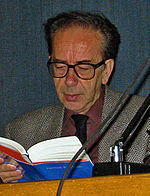About Ismail Kadare
- Ismail Kadare (Albanian pronunciation: [isma'il kada'?e], also spelled Ismaïl Kadaré in French; born 28 January 1936) is an Albanian novelist, poet, essayist and playwright.
- During the communist regime he was a member of the People's Assembly for 12 years (1970–82), and deputy chairman of the Democratic Front.
- He started writing poetry until the publication of his first novel The General of the Dead Army, which made him a leading literary figure in Albania and famous internationally.
- In 1996, he became a foreign associate of the Académie des Sciences Morales et Politiques of France. In 1992, he was awarded the Prix mondial Cino Del Duca; in 1998, the Herder Prize; in 2005, he won the inaugural Man Booker International Prize; in 2009, the Prince of Asturias Award of Arts; in 2015, the Jerusalem Prize, and in 2016, he was a Commandeur de la Légion d'Honneur recipient. Kadare is regarded by some as one of the greatest European writers and intellectuals of the 20th century and, in addition, as a universal voice against totalitarianism.
- Critical opinion is divided as to whether Kadare should be considered to have been a dissident or a conformist during the Communist period.
- Some academic commentators now regard Kadare's depiction of Albania under the Ottoman Empire as indebted to communist-era Orientalist artistic production, condemning it as Eurocentric, essentialist, fundamentalist and anti-modernist, giving rise to Islamophobia and racism.
Read more at Wikipedia
See Also
- Famous People's Birthdays on 28 January, Albania
- Famous People's Birthdays in January, Albania
- Famous writer's Birthdays on 28 January, Albania
- Famous writer's Birthdays in January, Albania
- Famous poet's Birthdays on 28 January, Albania
- Famous poet's Birthdays in January, Albania
- Famous novelist's Birthdays on 28 January, Albania
- Famous novelist's Birthdays in January, Albania


 Date of Birth:
Date of Birth:  Place of Birth: Gjirokastër, Gjirokastër County, Albania
Place of Birth: Gjirokastër, Gjirokastër County, Albania